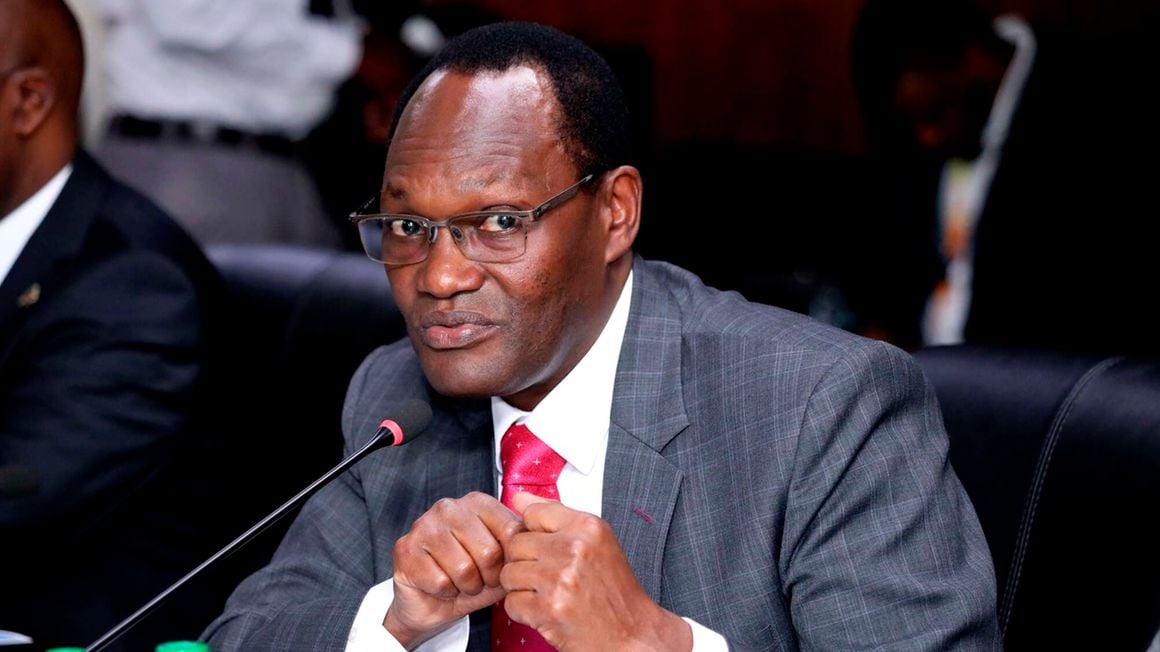
National Treasury Principal Secretary Chris Kiptoo on March 6, 2023. PHOTO | LUCY WANJIRU | NMG
The Treasury has splashed a new round of austerity measures for ministries, departments, and agencies(MDAs), chopping allowances for official travel to half and limiting the category of officers allowed to use planes on domestic routes.
In another notable shift, the Treasury has banned non-essential lunch, tea, and water for civil servants and reduced imprests for use by 50 percent.
“The Budget Implementation Committee has analysed the situation and has agreed on the need for the National Treasury to effect measures that will support budget and expenditure management,” Treasury PS Chris Kiptoo said in a circular.
Read: Treasury to save Sh130bn on spending cuts order
In the new measures, transport provision for civil servants on official duty has been capped at Sh5,000 from the current Sh10,000, and officers are encouraged “to use alternative and safe online taxis and public mode transport”.
Further, the use of local flights will be limited to officials in the rank of Cabinet secretary, principal secretary, director general, director, heads of department and their deputies as well as principal administrative secretaries.
“Lunches, teas, and snacks, as well as water, are rationalised with lunch only provided in exceptional cases. Fuel cards be rationalised as per available budgets,” he said, adding that office tea and other operational standing imprests will also be rationalised by 50 percent and effected from January 2024 in line with budget cuts.
The latest report by the Controller of Budget office shows that in the quarter to September, MDAs spent Sh6.02 billion on domestic travel, foreign travel, training, and hospitality compared to Sh7.4 billion in a similar window of last year.
In the quarter to September this year, public officers spent Sh3.15 billion on domestic travel, foreign travel(Sh1.16 billion), training (Sh647.4 million), and Sh1.05 billion on hospitality.
In the comparative quarter of 2022, public officers spent Sh2.44 billion on domestic travel, foreign travel (Sh927 million), training(Sh1.81 billion), and hospitality(Sh2.27 billion).
Dr Kiptoo said deep cuts would also affect communication and advertising budgets as well as hiring of meeting venues.
“Advertising in print media to comply with guidelines that require the Government Advertising Agency to give a lead,” he said.
The government is currently hard-pressed for resources to finance its essential projects in the wake of harsh economic times that have impacted revenue collection performance.
A harsh economy has impacted key sectors, meaning that the Kenya Revenue Authority (KRA) has struggled to net sufficient collections.
Between July and November, the taxman collected Sh963.7 billion which was 34.6 percent of the Sh2.787 trillion target for the 2023/24 financial year. During a similar period last year, the KRA had collected Sh856.6 billion (40 percent) of the Sh2.145 trillion annual target.
“Revenue collection has progressively increased in the last five months (July-November 2023/24) after KRA collected Sh963.746 billion compared to Sh856.646 billion collected in the same period last financial year, representing a growth of 12.5 percent,” noted a statement by KRA’s commissioner, strategy, innovation and risk management.
The taxman notes that revenue collection continues to be affected by factors including depreciation of the shilling and increasing commodity prices, which have driven down import demand.
“While import values (in Kenya shilling terms) grew by 36 percent and 11 percent in November 2023 and July-November 2023, respectively, in dollar terms, the growth for the month was subdued to nine percent and a decline of 9.2 percent recorded cumulatively,” said the KRA.
Read: Risks lurking in Treasury's ambitious spending plans
The latest austerity measures by the Treasury come barely a year after it issued radical directives to ease pressure on public expenditure, including cutting the entire budget on foreign travel, training, purchases of furniture and motor vehicles.
In the changes announced last November, The Treasury has additionally ordered the accounting officers of all MDAs to audit the salary requirements for their staff to curb abuse of funds through avoidable perks such as allowances.
→ aodhiambo@ke.nationmedia.com




No comments :
Post a Comment